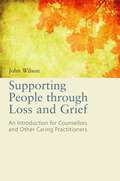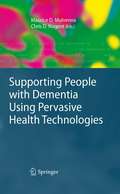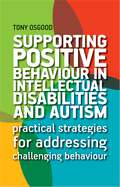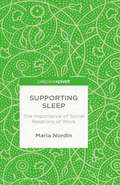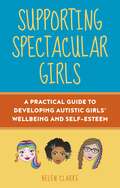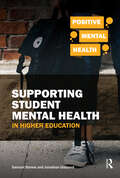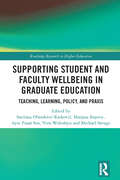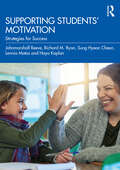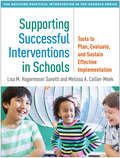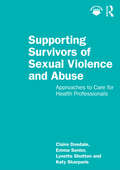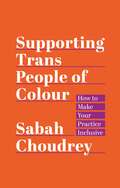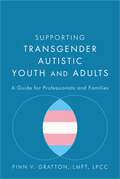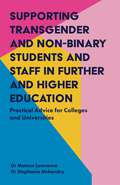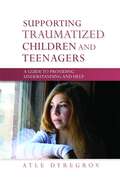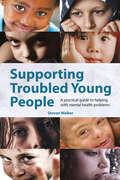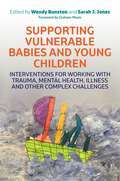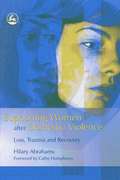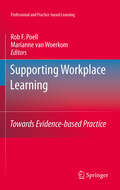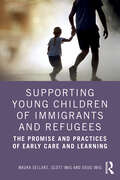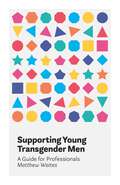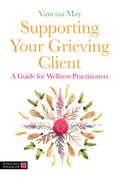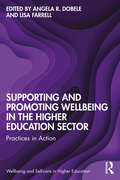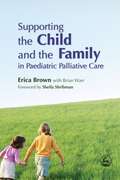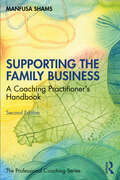- Table View
- List View
Supporting People through Loss and Grief: An Introduction for Counsellors and Other Caring Practitioners
by John WilsonWhat are the different theories of grief? What skills do you need for effective counselling? How can you support people experiencing loss and grief? This handbook provides a comprehensive guide to counselling and supporting people experiencing loss and grief. It introduces the different models and theories of grief, how theory relates to practice and what the essential skills are, and how to work with people in practice. Working with families, understanding diversity and assessing clients are all covered, as well as a chapter on personal and professional development. Case studies and real life examples demonstrate skills in action, and each chapter concludes with notes for trainers. This essential guide will help all those working with people suffering loss and grief to understand grief and how to help. Counsellors, bereavement support volunteers, palliative care nurses, hospice volunteers and students in these fields will all find this an invaluable resource. It can be used as a training guide as well as a resource for individuals, both as a learning tool and for continuing professional development.
Supporting People with Dementia Using Pervasive Health Technologies
by Chris D. Nugent Maurice D MulvennaInformation and communication technologies can provide new paradigms in healthcare provision. In particular, new Pervasive Healthcare technologies can revolutionise the dynamics of healthcare, enabling people to remain at home for longer, at lower costs to health and welfare organisations. This book reveals how pervasive healthcare technologies can be designed in conjunction with users and carers, as well as exploring the application of novel methods and technologies.
Supporting Positive Behaviour in Intellectual Disabilities and Autism: Practical Strategies for Addressing Challenging Behaviour
by Tony OsgoodThis highly practical book is an accessible and grounded handbook for addressing challenging behaviour in children and adults with intellectual or developmental disabilities (IDD), including autism. It recognises that challenging behaviour does not appear out of nowhere and is meaningful for the person exhibiting it. Behaviour can be communicative and an important signifier of underlying sensory or environmental issues. Focusing on a person-centred approach throughout, the book has advice and strategies for working with the client's families, support staff and professionals. It also presents best practice for analysing and addressing challenging behaviour in various settings such as schools, hospitals and the home, all while stressing the need to keep the human story at the heart of any assessment and intervention. Each chapter features questions for discussion or reflection and exercises for the reader to complete. Informal, frank and free of jargon, this is indispensable for professionals, parents, and anyone working with people with intellectual disability or autism.
Supporting Sleep: The Importance of Social Relations at Work
by M. NordinSocial support and sleep are both health promoting factors and important in the prevention of illness and sick-leave. Promoting healthy work by providing good conditions for strong social relationships and by preventing bullying or harassment can improve sleep and consequently employee health, increasing work productivity and efficiency overall.
Supporting Spectacular Girls: A Practical Guide to Developing Autistic Girls' Wellbeing and Self-Esteem
by Helen ClarkeAutistic girls can be frequently misunderstood, underestimated and therefore anxious in a school environment. This practical book offers an innovative life skills curriculum for autistic girls aged 11 to 15, based on the author's successful workshops and training, which show how to support girls' wellbeing and boost their self-esteem.Including an adapted PSHE curriculum, this is a straightforward guide to educating autistic children on the issues that matter most to them. It covers all essential areas of wellbeing, including communication, identity, self-regulation and triggers, safety, and physical and mental health, and offers the reader strategies to help the autistic girls in their lives enhance and develop these.
Supporting Student Mental Health in Higher Education
by Jonathan Glazzard Samuel StonesStudent mental health is a key consideration in higher education at the moment with recent reports identifying a major gap in provision by universities and how ill-equipped academics feel to support students. This book addresses these concerns, providing comprehensive guidance and workable evidence-informed strategies and interventions to help those working with students to support them effectively. It is suitable for lecturers, personal tutors, student counsellors, course leaders, heads of department and administration staff with responsibility for student support.
Supporting Student and Faculty Wellbeing in Graduate Education: Teaching, Learning, Policy, and Praxis (Routledge Research in Higher Education)
by Michael Savage Mirjana Bajovic Ayse Pinar Sen Vera Woloshyn Snežana Obradović-RatkovićSupporting Student and Faculty Wellbeing in Graduate Education recognizes new pressures impacting graduate students and their supervisors, teachers, and mentors globally. The work provides a range of insights and strategies which reflect on wellbeing as an integral part of teaching, learning, policy, and student-mentor relationships. The authors offer a uniquely holistic approach to supporting the wellbeing of both students and academic staff in graduate education. The text showcases optimized approaches to self-care, self-regulation, and policy development, as well as trauma-informed, arts-based, and embodied pedagogies. Particular attention is given to the challenges faced by minority groups including Indigenous, international, refugee, and immigrant students and staff. Providing a timely analysis of the current issues surrounding student and faculty wellbeing, this volume will appeal to scholars and researchers working across the fields of higher education, sociology of education, educational psychology, and student affairs.
Supporting Students' Motivation: Strategies for Success
by Richard M. Ryan Johnmarshall Reeve Sung Hyeon Cheon Lennia Matos Haya KaplanThis is a book about teachers’ classroom motivating styles. Motivating style is the interpersonal tone and face-to-face behavior the teacher relies on when trying to motivate students to engage in classroom activities and procedures. The over-arching goal of the book is to help teachers work through the professional developmental process to learn how to provide instruction in ways that students will find to be motivationally-enriching, satisfying, and engagement-generating. To realize this goal, the book features six parts: Part 1: Introduction, introduces what teachers are to support—namely, student motivation; Part 2: Motivating Style, explains what a supportive motivating style is; Part 3: “How to,” overviews the recommended motivationally-supportive instructional strategies one-by-one and step-by-step; Part 4: Workshop, walks the reader through the skill-building workshop experience; Part 5: Benefits, details all the student, teacher, and classroom benefits that come from an improved motivating style; and Part 6: Getting Started, discussesways to begin using these skills in the classroom. Based on a successful workshop program run by the authors, teachers successfully improve their classroom motivating style. In doing so, they experience gains in their teaching skill and efficacy, job satisfaction, a renewed passion for teaching, and a more satisfying relationship with their students. This multiauthored book provides teachers with the practical, concrete, step-by-step, skill-based "how to" they need to develop a highly supportive motivating style.
Supporting Successful Interventions in Schools: Tools to Plan, Evaluate, and Sustain Effective Implementation (The Guilford Practical Intervention in the Schools Series)
by Lisa M. Sanetti Melissa A. Collier-MeekEvidence-based interventions benefit learners only when they are implemented fully. Yet many educators struggle with successful implementation. This unique book gives practitioners a research-based framework for working with PreK–12 educators to support the effective delivery of academic, behavioral, and social–emotional interventions. Step-by-step procedures are presented for assessing existing implementation efforts and using a menu of support strategies to promote intervention fidelity. In a large-size format with lay-flat binding for easy photocopying, the book includes 28 reproducible worksheets, strategy guides, and fidelity assessment tools. Purchasers get access to a Web page where they can download and print the reproducible materials. This book is in The Guilford Practical Intervention in the Schools Series, edited by T. Chris Riley-Tillman.
Supporting Survivors of Sexual Violence and Abuse: Approaches to Care for Health Professionals
by Claire Dosdale Emma Senior Lynette Shotton Katy SkarparisThis textbook provides practical guidance to enable health professionals to support survivors of sexual violence. It gives insight into the complex and wide-ranging nature and experience of sexual violence, barriers to disclosure, and explores the implications for survivors, health professionals and healthcare organisations.An evidence-based resource, this book provides information, guidance and signposting for all those who might receive disclosures of sexual violence, challenging perceptions, stigma and judgement. As well as discussing disclosure of recent experiences, it takes into account that life events may trigger the re-surfacing of prior experiences. The book also operates as a practical tool, prompting professionals to reflect on their own clinical experience of dealing with disclosures of sexual violence. The chapters look at the full breadth of sexual violence and abuse, including rape and sexual assault, child sexual abuse, harassment and stalking, exploitation, trafficking, conflict situations, traditional practices and sexual violence in LGBTQAI+ communitites.Enabling readers to develop the necessary knowledge and understanding to inform their practice, this book is a comprehensive resource for all health professionals, across primary and secondary care. It is also a valuable text for those taking post-registration courses in sexual health, specialist community and public health nursing, district nursing, mental health and children’s nursing among others. Reflection sections can be used to support professional registration revalidation.
Supporting Trans People of Colour: How to Make Your Practice Inclusive
by Sabah Choudrey'Highly accessible and important' EUGENCE ELLIS'A deeply helpful and engaging read' MEG-JOHN BARKERProviding an accessible and authoritative introduction to issues around People of Colour (POC) trans inclusion, this book uses case studies, tips, checklists and anonymous survey results to set out best practice for any professionals working with trans people to create safer spaces, support and awareness.Trans people of colour are often excluded because gender and race are treated as separate issues. They are therefore left out from movements and services and in trans and non-binary spaces, their POC identities are overlooked. Choudrey's guide introduces the theory of intersectionality from the start, giving practical tips and steps to ensure that the community as a whole may be represented and creates a safer space for trans people of colour to thrive.An empowering and self-preserving tool, Supporting Trans People of Colour is an invaluable resource for therapists, counsellors, healthcare professionals, and those working in education and charities, as well as those wanting to make their approach and service more inclusive.
Supporting Transgender Autistic Youth and Adults: A Guide for Professionals and Families
by Finn V. GrattonProviding advice on how professionals working with autistic trans youth and adults can tailor their practice to best serve their clients and how parents can support their trans autistic children, this book increases awareness of the large overlap between trans identities and autism.<p><p>By including chapters on gender diversity basics, neuroqueer trauma and how to support neuroqueer individuals, this book sets out strategies for creating more effective support that takes into account the unique experiences of trans people on the spectrum. <p><P>Written by a therapist who identifies as neuroqueer, this book is the perfect companion for professionals who want to increase their knowledge of the experiences and needs of their trans autistic clients.
Supporting Transgender and Non-Binary Students and Staff in Further and Higher Education: Practical Advice for Colleges and Universities
by Matson Lawrence Stephanie MckendryAccording to the research underpinning this book, 85% of trans students and staff faced barriers. This practical guide enables post-secondary education professionals to create a safe and supportive environment for gender diverse applicants, students and staff. Using real life examples to explore common experiences and challenges for trans people in further and higher educational settings, it sets out policies, interventions and advice that have proven effective in providing impactful support on a wide range of issues such as learning, teaching, mental health, recruitment, support services, and institutional policies. Included is an easy-to-follow introduction to transgender terminology and identities, as well as legal and medical considerations.
Supporting Traumatized Children and Teenagers
by Atle DyregrovSupporting Traumatized Children and Teenagers is an accessible, comprehensive book providing an overview of the impact of trauma on children and adolescents and how they can be supported following trauma. Trauma can result from a range of experiences from bullying to witnessing violence to living through war. This book explores the different reactions children may experience, and the impact trauma can have. Variables affecting the impact of trauma are explored such as different developmental stages, gender, the reactions of friends and parents, the child's personality, and their caring environment. Appropriate and effective ways of helping children after a traumatic event are outlined, and different types of therapy, such as group therapy and cognitive behavioural therapy, are discussed. The book offers case examples and practical tips throughout, and includes a chapter on how someone working with a traumatized child can help and look after themselves. This book will be invaluable to a range of professionals working with traumatized children including counsellors, child and family social workers and therapists, as well as others involved with traumatized children such as foster carers and teachers.
Supporting Troubled Young People: A practical guide to helping with mental health problems
by Steven WalkerSupporting Troubled Young People provides a vital and much-needed resource for anyone involved with children and young people who are suffering from or at risk of developing, mental health problems. Problems such as self-harm, eating disorders, and anxiety and depression are increasing, while young men, in particular, are at increasing risk of suicide. This is against a backdrop of NHS CAMH services unable to cope with demand and resources in the voluntary sector being stretched beyond their capacity. This means parents, teachers, social workers and nurses are often the first and only help available. This book gives them a jargon-free, accessible guide to help them assess situations, provide skills and guidance to support children and young people, and know how and where to get more help for them. Full of practical tips, advice, exercises and case studies Articulates gender, multi-cultural, spirituality and sexuality issues Tackles contemporary issues such as cyber bullying, eating disorders and self-harm Uses research and established theory in an engaging way enabling the reader to translate ideas into modern multi-cultural practice Supporting Troubled Young People provides any worker involved in supporting, helping and caring for young people with a practical resource to use in their work as teachers, social workers, nurses, youth workers, doctors, foster carers, residential staff, psychologists and psychiatrists. Parents and young people will also find much of value here.This book makes a rich contribution to the understanding and treatment of children’s mental health at a time when this is desperately needed. It is well-informed, full of case illustrations to guide the reader, and is written by a compassionate therapist and researcher with a solid grasp of the complex social environment in which children live today.Dr Chris Nicholson – Head of the Department of Psychosocial and Psychoanalytic Studies, University of Essex.
Supporting Vulnerable Babies and Young Children: Interventions for Working with Trauma, Mental Health, Illness and Other Complex Challenges
by Julie Stone Paul Robertson Jenifer Wakelyn Fiona True Angelique Jenney Kathy Eyre Nicole Milburn Angie Zerella Lisa Thorpe Luella Monson-Wilbraham Kerry Arabena Hisako Watanabe Rachel Rozentals-Thresher Robyn Hemmens Natasha Whitfield Dr Ben Grey Jeremy Gunson Jennifer McIntosh Dr Christine Hill Maria McCarthy Dr Helen Shoemark Amity McSwan Louise DockeryThe diverse challenges that clinicians and children's workers tasked with safeguarding babies and young children face are complex, and this unique book looks at effective, practice-based and evidence-informed approaches to working across a wide range of issues.It outlines relevant theory and good practice, gathering case examples from around the world to illustrate what interventions look like in direct practice. Leading contributors address a wide range of challenges, including babies and very young children who have a serious illness, have complex diagnoses, or have been exposed to violence or adversity in early childhood.This is an essential guide for those who work to support and safeguard the welfare of babies and very young children, including professionals in health care, social work, mental health and child protection settings, as well as paediatricians, child psychologists and child psychiatrists.
Supporting Women after Domestic Violence: Loss, Trauma and Recovery
by Cathy Humphreys Hilary Abrahams'This is really interesting and compelling book. Abrahams' writing style is readable and engaging and is interspersed with reference to research and powerfully, the words of women who have experienced domestic violence. Right from the beginning of this book, there are passages that challenge stereotypes and tackle stereotypical thinking regarding women who experience domestic violence... Very engaging, Really useful. Powerful and authoritative, I'd recommend this book to anyone working with women, whether in the community or the workplace. I have worked with a variety of groups (children, families, people with mental health problems, older people) and domestic violence has been a factor in working in all these areas of work. This text will certainly be useful to me and no doubt to many others addressing issues of domestic violence.' - Well-Being 'Abrahams gives us a sense of how lives are shattered and rebuilt in this compelling book that is the culmination of a research project exploring the experiences of women and children in three refuges in the UK... It is a key resource for those working within women's refuges, as well as for professionals whose work brings them into contact with victims of domestic violence. Those tasked with developing and implementing public policy would also find it enlightening.' - Therapy Today 'Compelling reading for anyone working with women and children living with and leaving domestic violence.' - From the Foreword by Cathy Humphreys Women who leave an abusive relationship often experience feelings of fear, bewilderment, anger and confusion. The trauma caused by domestic violence leaves a legacy that stays with the survivor, and it is not uncommon for women to experience feelings of loss and grief similar to those following bereavement, but made more complex by the effect that abuse has had on their emotional health and well-being. Supporting Women after Domestic Violence offers accessible advice on how to enable women who have experienced domestic violence to embark on a journey of recovery. The book draws on theory, original research and the personal experiences of women who have encountered domestic violence to explore the complex practical and emotional support they need when engaging in the process of recovery. It highlights the difficulties a victim of domestic violence may encounter following an abusive relationship, offers action points to improve service provision, and covers important issues in recovery, such as the value of mutual support and how women can regain a sense of normality and self-esteem. This book will be a key resource for those working within women's refuges, as well as social workers, counsellors, mental health professionals and many others whose work may bring them into situations where domestic violence is an issue.
Supporting Workplace Learning: Towards Evidence-based Practice
by Marianne Van Woerkom Rob F. PoellDuring the 1990s, the workplace was rediscovered as a rich source of learning. The issue of workplace learning has since received increasing attention from academics and practitioners alike but is still under-researched empirically. This book brings together a range of state-of-the-art research papers addressing interventions to support learning in the workplace. The authors are experienced international scholars who have an interest in making HRD and workplace learning practices more evidence-based through practical relevant research. Although workplace learning is largely an autonomous process, many organizations want to manage it as part of their broader HRD strategy. There are limits, however, to the extent to which the complex dynamics of learning in the workplace can be guided in pre-determined desirable directions. This tension between the possible strengths of workplace learning and the limits of managing it is at the heart of this volume. The book is broken into three sections. The first section deals with workplace learning interventions, including HRD practitioners' strategies, training and development activities, and e-learning programs. The second section investigates the impact of social support, or lack thereof, in workplace learning, such as mentoring, coaching, and socialization practices. The third section addresses collective learning in the workplace, looking at teams, knowledge productivity, and collaborative capability building.
Supporting Young Children of Immigrants and Refugees: The Promise and Practices of Early Care and Learning
by Maura Sellars Scott Imig Doug ImigThis text offers a comprehensive portfolio of approaches to support young children with refugee backgrounds. It covers trauma-informed pedagogies, transitioning to school, authentic inclusion, play, social and emotional learning, and intergenerational trauma.In early childhood centres around the world, teachers and directors can be uncertain of how to meet the needs of newly arrived children. Based on empirical research in five countries, this book offers insights from early childhood educators who are working hard to support families and young children with refugee and asylum-seeker experiences. It illustrates the link between theory and practice and the importance of developing culturally sensitive classroom strategies to effectively support the emotional and cognitive needs of multilingual, multicultural students whose common experiences may only include displacement, trauma, and loss. Rather than offering a measure for ‘success,’ this book shares the knowledge and experience of practitioners who understand the work and the very particular circumstances of these children’s lives. The authors bring these perspectives together in order to inspire other professionals who face this challenging work, encouraging the reader to reflect, to consider how relevant some of the ideas may be in their own contexts, and to contemplate the principles which allow their professional actions to make a difference.This book is an essential resource for early childhood educators and leaders who want to ‘open the door’ to genuinely inclusive, empathetic, and supportive practice. It will be of great interest to researchers and postgraduate students in the fields of early childhood and primary education.
Supporting Young Parents: Pregnancy and Parenthood among Young People from Care
by Elaine Chase Abigail Knight Ian Warwick Peter AggletonSupporting Young Parents explores early pregnancy and parenthood from the perspectives of young men and women in and leaving care. Most discussion about teenage pregnancy and parenthood focuses on the negative consequences for teenagers and their children. Yet, for some young people, particularly those who have been disadvantaged in life, early parenthood may offer the security of a family life, a sense of stability and an opportunity to build emotional attachments. This book draws on authoritative research into the reasons for and experiences of pregnancy and parenthood among young people from local authority care. It questions the assumptions that early parenthood always limits young people's choices and opportunities and examines the types of support most likely to enable successful parenting. This book will be essential reading for community nurses, health visitors, social workers, academics and students working in the fields of health, education and social care.
Supporting Young Transgender Men: A Guide for Professionals
by Matthew WaitesThere is currently a lack of information available regarding the specific needs of young transgender men, and the barriers that they face. This can lead to professionals having to give generic advice, which may not be appropriate for the situation. Written to address this shortfall, this book provides professionals with the guidance they need to effectively and supportively work with young transgender men. It looks at some of the obstacles that trans men face across health and care services. Addressing topics such as the social impact of transitioning, the potential impact on mental health and emotional wellbeing and common myths and misconceptions about transitioning, this guide is essential for anyone working with young transgender men.
Supporting Your Grieving Client: A Guide for Wellness Practitioners
by Vanessa MayFor most people, grief is an inevitable part of life and if you're a wellness practitioner, then the likelihood is that you will at some point work with a bereaved client. This may initially seem like a heavy responsibility and so this guide aims to help you feel prepared and confident in how you support your client. It will explain how loss and grief can place tremendous strain on the body and how it may manifest physically, mentally, and spiritually, whilst equipping you with the tools and resources you need to support your grieving client.Vanessa May draws from over 16 years' worth of experience as a registered nutritional therapist, wellbeing coach, and trauma-informed holistic grief coach. As a result, she is able to cover nutritional medicine support whilst also educating readers on grief models and theories versus the actual reality of grief through her own experiences of traumatic loss and various case studies.This is an invaluable book for all types of wellness practitioners and therapists who would like to understand how to approach and make space for their clients' bereavement.
Supporting and Promoting Wellbeing in the Higher Education Sector: Practices in Action (Wellbeing and Self-care in Higher Education)
by Lisa Farrell Angela R. DobeleThis book provides innovative, practical tools to help combat declining personal wellbeing in the higher education workplace.Divided into two sections, the book looks at wellbeing from institutional and individual levels. It outlines a framework for how wellbeing in the higher education workplace can be evaluated and clearly sets out initiatives for what can be done to improve faculty wellbeing. The book also explores issues such as the once vocational nature of academia, the extent to which institutions can provide allied health care and examines initiatives that individual faculty members have introduced for themselves.Representing new ideas, perspectives and a variety of approaches to supporting and promoting wellbeing in the higher education workplace, this book will be of interest to academic staff as well as professional development personnel in higher education.
Supporting the Child and the Family in Paediatric Palliative Care
by Erica Brown Brian Warr Anne Smallman Sheila ShribmanSupporting the Child and the Family in Paediatric Palliative Care provides a comprehensive overview of good practice in caring for terminally-ill children, young people and their families. Drawing from extensive personal experiences of working in paediatric palliative care, the author provides guidance on issues including symptom management and pain relief; cultural, religious and spiritual aspects of care; and the role of education for life-limited children. Addressing the importance of individual needs, the book looks at emotional, social and cognitive support at different stages of the illness, how parents and professionals can respond to children's own questions about death, and the impact of life-limiting illness on the whole family - including grandparents and siblings. The material offers helpful suggestions on how to support families in making informed choices during distressing periods, such as where their child will die and how to prepare for the funeral. This book is a practical and invaluable tool for nurses, paediatricians, hospice care staff, bereavement counsellors and all those caring for life-limited children.
Supporting the Family Business: A Coaching Practitioner's Handbook
by Manfusa ShamsThis fully updated second edition provides evidence-based, solution focused techniques for applying coaching in family business settings. Manfusa Shams has demonstrated the critical connection between coaching skills, family business functions, experiential and reflective learning. Edition updates incorporate material on homeworking, family dynamics, team coaching, online business coaching. Featuring accessible case studies, practical tools and techniques, all chapters showcase how practitioners can learn from the coaching practice and the skills, competencies and experiences needed to provide effective family business coaching. The book particularly emphasises interventions which are compatible with virtual coaching to support family businesses to achieve business goals and to retain their competitive edge. Supporting the Family Business is a valuable guide for the continued professional development of practitioners working with family businesses, as well as members of family businesses seeking new learning and development opportunities.
